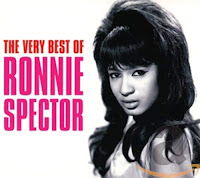Monday, February 26, 2024
Review: 'Teenage Wasteland: The Who at Winterland, 1968 and 1976'
Friday, August 11, 2023
Review: 'But Will You Love Me Tomorrow?: An Oral History of the '60s Girl Groups'
Between the original rock and roll era of Chuck, Buddy, and Bo and the British Invasion, the most happening thing happening in rock and roll was the girl group sound. Fresh, sexy, fun, and often emotionally raw, hits by The Supremes, The Marvelettes, The Ronettes, Darlene Love, The Angels, The Vandellas, The Crystals, The Shirelles, and the rest made radio worth listening to. Once The Beatles arrived in the Colonies, only the Motown groups really hung on (and let's not forget that The Supremes remained America's most unstoppable hit machine of the sixties), but the music they all made is timeless.
Wednesday, January 12, 2022
Farewell, Ronnie Spector
Rock and roll was always aimed at a young audience, and from the genre's very beginning, rock singers' were voicing the concerns and feelings of their teenaged audience. Artists like Chuck Berry and Buddy Holly may have been experts at writing lyrics that reflected the antiestablishment angst or romantic yearnings of their young audience, but they didn't really sound like kids themselves. Neither did Elvis or Little Richard or Fats Domino or Darlene Love. Ronnie Spector, however, did.
Just eighteen when she started recording with The Ronettes, Veronica Bennett sounded like a kid because she basically still was one, but even when she started having hits with the glorious "Be My Baby" at age twenty , she always retained that youthful timbre. However, she always enriched her high-pitch with a real sense of experience and completely unfiltered emotion.
When she married Phil Spector, the producer of her most unforgettable hits, her career slammed to a halt as he basically kept her a prisoner in her own home. Fortunately, she had the guts to escape her abusive spouse, tell her story, and continue singing in that magical voice pitched right on the borderline of adolescence and adulthood. Whether Ronnie Spector is singing "Be My Baby" or "I Saw Mommy Kissing Santa Claus", her voice always tears my heart out in the best way. Sadly, she died today at the age of 78 after suffering from cancer.
Monday, November 21, 2016
Review: 'Eight Days a Week: The Touring Years' Blu-ray
Saturday, June 8, 2013
Review: 'My Name Is Love' by Darlene Love
Wednesday, September 21, 2011
Review: 'Little Symphonies: A Phil Spector Reader'
Following a brief introduction from the editor, things really get underway with a Nik Cohn piece published in a late 1972 issue of Creem. The writer weaves his and Spector’s expectedly strange encounters with a tidy, yet opinionated overview of the producer’s career. Sleazy and beautiful, “Nik Cohn Visits Mr. Spector” is the kind of Rock writing that simply doesn’t exist anymore.
Now that we have our outline of Phil sketched, the details are ready to be painted between the lines. Greg Shaw’s “To Know Him Is to Love Him” (History of Rock- 1982) provides a solid image of Spector’s early career and initial hits. Bob Finnis’s “Phil Spector’s Wall of Sound” (Radio One: Story of Pop- 1973) presents an essential introduction to that echo-swathed monolith of clattering percussion, throbbing basses, chiming acoustic guitars, shimmering strings, and punishing drums. Interviews with producers Phil Chapman and Mark Wirtz probe deeper behind the wall, revealing how, exactly, Spector created his inimitable sound. This stuff is interesting for listeners but downright educational for producers both novice and veteran.
Little Symphonies continues to fascinate with a pair of interviews with Ronnie Spector conducted two decades apart (she is far more comfortable criticizing her ex-husband in the later discussion), several pieces on the mono and stereo variations of Spector’s records, a Richard Williams article and an interview with May Pang that paint portraits of the chaotic studio atmospheres during Spector’s sessions with John Lennon, and an account of the even more chaotic End of the Century sessions written by Dee Dee Ramone, himself.
Varied, entertaining, and endlessly informative with a refreshing minimum of overlapping information, Little Symphonies: A Phil Spector Reader provides a superb selection of Spectornalia essential for all Philophiles.
Thursday, April 14, 2011
Full Line-Up of Ray Davies's Meltdown Announced
Hendryx and Wickham





